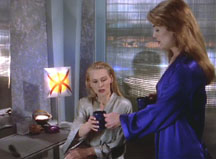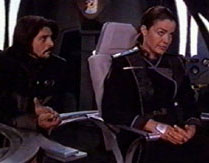July 25, 2005
A column tackling gay issues, gay themes, and just general gayness in television
Out-TakesThe Last, Best Hope for Queers
BABLYON 5 may not be perfect, but it's the best future we've got.
I enjoy complaining about things. I'm just that kind of girl, the one who gets a kick out of seeing how things are being badly done and grousing about them. But every now and then, even I have to admit that there are things I just plain like — and one of them is Babylon 5's subtle-yet-charming queer ethic.
| In the world of the future, there are still ways boys traditionally behave that are not the same way as girls traditionally behave; a few centuries of human progress just aren't enough to wipe out millennia of history. Which, quite frankly, is a rather honest way of looking at things. |
Instead, though LBGT persons are still something of a minority, they are a minority whose presence has become so commonplace that it requires no more comment. People still tend to assume others are mostly straight, but not in a way that indicates disproving this assumption would be any tremendous shock. My favorite example of this acquired normalcy is when Marcus and Franklin (both male) have to travel undercover to Mars, and do so under the cover of being a married couple on honeymoon; there is associated befuddlement and protest from Franklin's end of the deal, but it stems entirely from the idea that he might be married to Marcus, and not from the fact that he might be married to another man.
 |
In truth, I can't be angry that the relationship barely existed for more than a single episode. Though I wouldn't put it past creator J. Michael Straczynski to have planned them to be a couple from the beginning — he's famous for setting up plotlines and twists years in advance — there was no way he could have forseen how it was going to end. Actor Andrea Thompson, who played Talia, made her departure from the show to other things just about the time her character's relationship with Ivanova was heating up, necessitating an end to the pair almost as it was beginning. In multiple interviews, however, both actors and creator have stressed how Thompson's departure was the only thing that ended the same-sex couple, and all three would have been just pleased as punch to have that particular storyline continue.
I can't even be angry that Talia mostly disappeared off the show's radar after her abrupt departure. For starters, I can't imagine anyone else's having the nerve to bring up such a thing around the very private Ivanova, nor Ivanova's desire to talk about it. However, the real kicker comes two entire seasons later, when Ivanova — in a ceremony of deep confession — admits, 'I think I was in love with Talia.' And the look of abject sympathy with which Delenn rewards this utterance breaks my heart every time.
 |
Never once does Marcus/Ivanova seem an attempt to straighten either character — because, well, Marcus is mighty femme1, and though he may be a pretty boy who can kick your ass, that doesn't stop his being a pretty boy. However, unlike other heterosexual relationships I might name, this one never feels forced or awkward. You can understand why he likes her, you can understand why she's reluctant, you can understand why she eventually starts falling for him anyway, and your inner teenage girl sobs when he dies heroically to save the woman he loves. Those who would wish to fashion het relationships from queer characters — hell, those who would wish to fashion relationships, period — really should take note: This is how you do it.
| In the end, I can accept a show that's at least honest about its world's shortcomings in the areas of gender and sexual equality, far more readily than I'll ever cotton to one that assumes it's that being progressive means you don't talk about it. |
1We summarised the episode 'A Late Delivery from Avalon' thusly: A man claiming to be King Arthur appears on the station, and no one believes him, except for Marcus who read The Mists of Avalon, like, thirty times in high school.
NEXT TIME, ON OUT-TAKES: Likely some Dr. Who, maybe some Oz, and probably that Firefly movie (once the rest of you have seen it, of course).
Email the author.
All written content © 2005 by the authors. For more information, contact homer@smrt-tv.com
